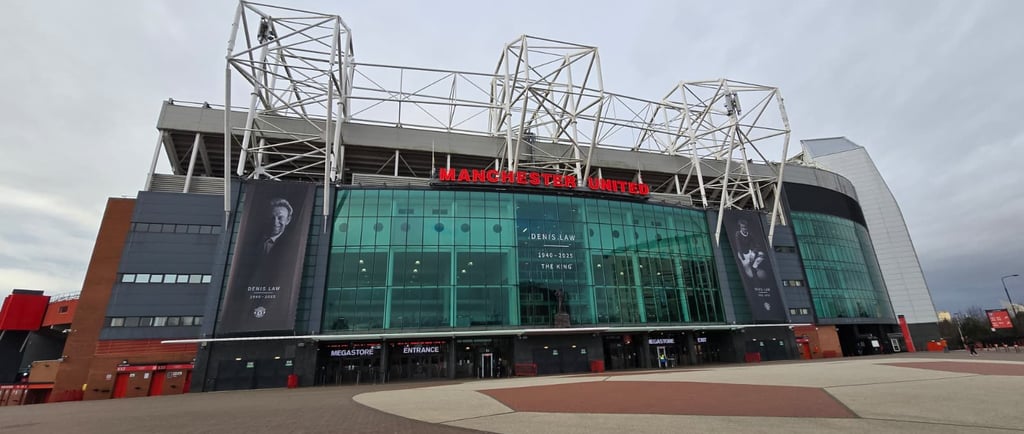Drama at Old Trafford
United’s 3–2 win over Burnley had it all — injuries, missed chances, late drama, and Bruno Fernandes running the show. Yet beneath the excitement, old problems resurfaced. Slow build-up play, soft goals conceded, and uncertainty in goal continue to haunt this team. With Sesko now leading the line, questions linger: can United provide the service a number 9 needs, and will a shaky goalkeeper derail progress once again?
DA
8/31/20254 min read


United launched their latest range of clothing this week, branded with the word Drama. And fittingly enough, there was plenty of it at Old Trafford on Saturday.
The build-up to the game was dominated by one name: Sesko. All the talk was about him not starting, sat on the bench instead of leading the line. When the teams came out, United looked sharp, full of energy and purpose. Cunha and Mbeumo linked well in tandem, setting the tone. But that didn’t last long — Cunha’s early injury disrupted the attack, and from then on, things looked unsettled for a while.
The midfield was where things got really interesting. Casemiro sat alongside Fernandes, who played further back than usual as one of the two pivots. Mount, while he was on, impressed. For all the possession, pressure, and chances, though, United couldn’t find the net in front of the Stretford End. But if this was theatre, the lead role was clear. Fernandes was the main character of this pantomime. Every dead-ball, every opposition goal-kick, every throw-in – he was shouting orders, pointing, shouting, dictating. He told teammates where to stand, who to mark, when to press. Even when we had the ball, he was setting the pace and direction. It was non-stop orchestration.
Eventually, United got their goal. Scrappy, yes, but deserved. Still, the same old issues remain. You can talk tactics and “transitions” all you like, but football boils down to speed of thought and execution. Burnley’s equaliser said it all. Ball out wide, quick cross, goal. United by contrast are still guilty of playing sideways, too slow, too safe. Under Ten Hag this was a real weakness, and Amorim has improved it – but it’s far from fixed. Only late on did we see quick, dangerous balls whipped into the box, twice in two minutes in fact; Sesko (a second half substitute) got on the end of them but couldn’t direct them goalwards.
This raises a bigger point. Hojlund was often criticised for not getting on the end of crosses. Fair. But strikers also need trust in service. Van Nistelrooy thrived because he knew Beckham or Giggs would deliver early, quality balls. That consistency gave him confidence to attack the space. Without it, a number 9 is always guessing. Hojlund suffered for it, and unless United improve, Sesko might too. It’s not rocket science – it’s about timing, rhythm, and repetition.
United retook the lead, only to concede again – another soft one. Which brings us to the real elephant in the room: the goalkeeper.
A couple of times in the second half, when Bayındır had the ball in his arms, it was Fernandes telling him to slow it down, to put it on the floor. The crowd didn’t like it. It raised a question: is Fernandes’ micro-managing creating tension, especially for the keeper? Because now, with him deeper, he’s talking directly to the defence and keeper more than ever. It’ll be fascinating to watch how that develops.
This team doesn’t need another centre-back or full-back. It doesn’t need another midfielder (or at least not as much as much as has been suggested). It needs a keeper who commands his box, not one who needs to directed. Since David de Gea left, United haven’t had one. Letting him go, only to spend a fortune on Onana, will go down – in my view – as one of the worst pieces of transfer business in the club’s history. Onana never convinced, and while Bayındır looks marginally steadier, he still doesn’t dominate his area nor instil confidence. The crowd feels it too – that tension every time a corner or free-kick comes in is palpable. You can almost sense the collective nervousness, because we all know teams can score against us with the simplest of set pieces.
In stoppage time, Fernandes got the winner from the spot, coolly putting away the penalty. But even then, he’d had his frustrations – a couple of misplaced passes, a yellow card, some grumbles from the crowd. That’s the paradox of Fernandes. Not everyone likes him as captain. He moans, he gestures, he argues.
But strip that away, and you’re left with the heartbeat of the team.
Against Burnley, he made 15 defensive contributions – fifteen – while still being our main creative outlet, penalty taker, free-kick and corner specialist. That’s a huge burden. Week after week, the mental and physical load he carries is enormous. For now, United can just about ride that wave because we’re not in Europe and (thanks to midweek) not in the League Cup. But relying so heavily on one man is a dangerous game.
And let’s be clear: we still conceded two goals to a team that was in the Championship last season. We should not be celebrating a 3–2 win like this is some great achievement. Performances like that will not work against the top four. This team needs to change.
I’m convinced a proper goalkeeper would settle the defence, and from there, the whole team would grow in confidence. Last season, every time momentum was building, it was undone by a defensive error born out of confusion and uncertainty. Football is a game of confidence as much as skill. Without it, talent counts for little. Right now, United’s biggest weakness is obvious to every fan and every opponent: the mentality isn’t right, and it all stems from the keeper. Until that changes, this team can forget about Europe and glory.
Community
Connecting fans worldwide, celebrating heritage and values.
Contact
info@mumsc.org
© 2025. All rights reserved.
Powered by IT CORE SERVICES LTD
